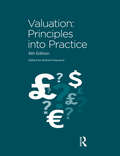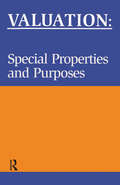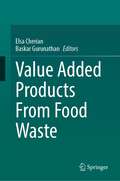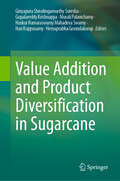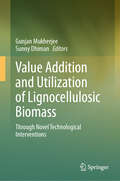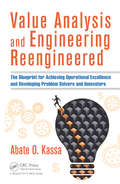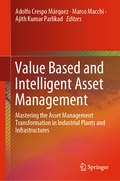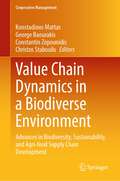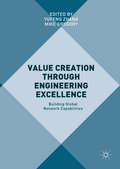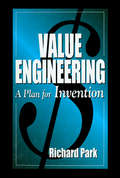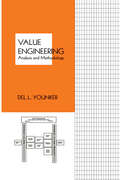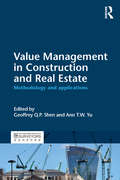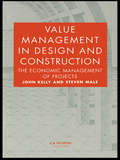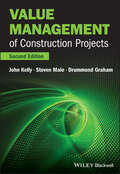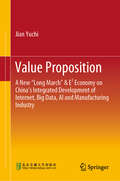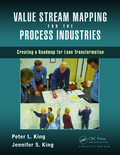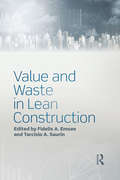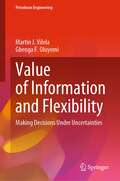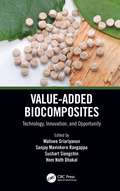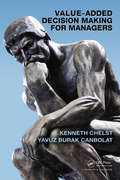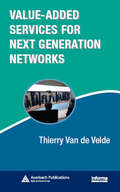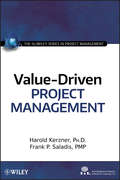- Table View
- List View
Valuation: Principles into Practice
by R. E. H. HaywardThe sixth edition of Valuation: Principles into Practice continues to be both a core text for all students undertaking surveying qualifications and a handy reference guide for valuers in practice. The new edition has been thoroughly updated with nine completely re-written chapters. The book provides extensive details of valuation principles and practices in agricultural, commercial, residential, industrial and leisure sectors. The balance of academic and practicing contributors explore the law and regulation within the field of valuation and include chapters on valuations for financial investments, taxation and rating insurance, as well as useful case studies and detailed approaches to valuation procedures for a variety of properties from farms to public houses. With extensive market knowledge and the obvious benefit of his involvement with the five previous editions, Richard Hayward brings the sixth edition well into the twenty-first century. The book continues it’s tried and tested melding of ‘town and gown’, and the twenty six contributors to the twenty three chapters are all leading specialists in their fields.
Valuation: Special Properties And Purposes
by Phil Askham Leslie BlakeEach topic treated represents an area of specialism in its own right. This book helps fill the gap between the extremes of neglect and detailed consideration in existing texts by providing an authoritative and yet accessible treatment of several complex and technical subjects. Each chapter has been written by an acknowledged expert in the field with extensive practical experience, and where appropriate is supported by comprehensive case studies and worked examples. What this book emphatically will not do, is turn anyone into an expert in the specialist and even arcane worlds of the plant and machinery valuer or the valuation of milk quotas. What it will do, however, is give some indication of the problems and pitfalls associated with these fields.
Value Added Products From Food Waste
by Baskar Gurunathan Elsa CherianThe rapid increase in industrial processes for the preparation and processing of various food products have resulted in the creation of large quantities of waste. These food wastes contain large amounts of nutrients which can be further converted into useful products, making byproduct technology increasingly important.Byproducts produced from various agro-based industries like cereals, fruits, vegetable processing, fish, meat and poultry can be converted into beneficial products. For instance, cereal and legume processing produces large quantities of wastes which can result in environmental problems affecting air, soil and water quality. These wastes can be efficiently utilized and converted into value added products such as bioethanol, butanol, biohydrogen, biogas, biocoal, industrially treasured enzymes, biofertilizer, proteins and organic acids. Value Added Products From Food Waste covers waste management techniques utilized for managing raw materials in the food industry in an efficient way, recovering and reusing waste or neutralizing unwanted components. Chapters focus on the latest technologies and efficient management systems in all areas of food processing that make this process economical and minimize the hazards caused by the deposition of waste. From the dairy industry to cereals to fruits and vegetables to fish, each aspect of the food industry is examined with an eye for how to utilize food waste, transforming these wastes into value added products.
Value Addition and Product Diversification in Sugarcane
by Gopalareddy Krishnappa Giriyapura Shivalingamurthy Suresha Murali Palanichamy Huskur Kumaraswamy Mahadeva Swamy Hari Kuppusamy Hemaprabha GovindakurupThis contributed volume covers sugarcane byproducts, preservation, functional foods, bioethanol, and liquid fuels. It focuses on advancements in value addition and its applications in food and other industries, sugarcane biomass, and its utilization in the energy sector. Sugarcane production has been increasing for several decades; however, it has only recently gained importance for product diversification and bioenergy applications. The book also explores biopharming/molecular pharming, genomics for product diversification, biotechnological manipulations for bioenergy applications, metabolic engineering, bioenergy policy, economics, and market intelligence. This book provides an opportunity to compile recent technological advancements in value addition and product diversification, offering insights into the role of sugarcane in green fuels and global energy security in a sustainable manner. This book caters to the needs of various stakeholders, including students, researchers, policymakers, and academicians working in functional foods, nutraceutical research, bioenergy, and synthetic biology. It is also designed for personnel in the sugar and food industries, green fuels, chemical industries, and textile and recycling industries.
Value Addition and Utilization of Lignocellulosic Biomass: Through Novel Technological Interventions
by Gunjan Mukherjee Sunny DhimanThis book addresses the pressing global challenge of lignocellulosic biomass waste by exploring innovative technological solutions for its mitigation and conversion into valuable products. One of the key challenges faced is the effective management of lignocellulosic biomass waste generated from various industries, including agriculture, forestry, and food processing. The demand for sustainable solutions for lignocellulosic waste management is steadily increasing, driven by environmental concerns, government regulations, and the pursuit of circular economy principles. This book aims to delve into the innovative technological solutions driving these transformations. It provides valuable insights into the transformative potential of these approaches in lignocellulosic biomass waste mitigation and the transition towards a more sustainable environment. This book is a definitive resource for researchers, professionals, and policymakers engaged in the fields of lignocellulosic biomass valorisation, waste management, and sustainable development. The exploration of case studies, economic assessments, and policy perspectives will contribute to the body of knowledge in this critical field and facilitate the transition towards a more sustainable future.
Value Analysis and Engineering Reengineered: The Blueprint for Achieving Operational Excellence and Developing Problem Solvers and Innovators
by Abate O. KassaBy mastering the re-engineered value analysis & value engineering (VA/VE) problem-solving value methodology outlined in this book, any organization will be able to self-diagnose problems and self-discover solutions. The book is the product of Abate Kassa's dual lenses of experience and research over four decades. The book updates and upgrades VA/VE by integrating popular improvement methodologies, including Six Sigma, Lean Manufacturing, Total Quality Management, Kaizen, Business Process Reengineering, and Project Management, into the scientific method of the value methodology he dubbed PISERIA.
Value Based and Intelligent Asset Management: Mastering the Asset Management Transformation in Industrial Plants and Infrastructures
by Adolfo Crespo Márquez Marco Macchi Ajith Kumar ParlikadThe fundamental motivation of this book is to contribute to the future advancement of Asset Management in the context of industrial plants and infrastructures. The book aims to foster a future perspective that takes advantage of value-based and intelligent asset management in order to make a step forward with respect to the evolution observed nowadays. Indeed, the current understanding of asset management is primarily supported by well-known standards. Nonetheless, asset management is still a young discipline and the knowledge developed by industry and academia is not set in stone yet. Furthermore, current trends in new organizational concepts and technologies lead to an evolutionary path in the field. Therefore, this book aims to discuss this evolutionary path, starting first of all from the consolidated theory, then moving forward to discuss: • The strategic understanding of value-based asset management in a company; • An operational definition of value, as a concept on the background of value-based asset management; • The identification of intelligent asset management, with the aim to frame a set of “tools” recommended to support the asset-related decision-making process over the asset lifecycle; • The emergence of new technologies such as cyber physical systems and digital twins, and the implications of this on asset management.
Value Chain Dynamics in a Biodiverse Environment: Advances in Biodiversity, Sustainability, and Agri-food Supply Chain Development (Cooperative Management)
by Constantin Zopounidis Konstadinos Mattas George Baourakis Christos StaboulisThis book offers comprehensive insights into the latest developments in biodiversity, sustainability, and agri-food supply chains, fostering an informed approach to policymaking decisions in the agriculture and agri-food industry within the global economy. By addressing key societal and environmental challenges, such as desertification, floods, epidemics, rising trade costs, and food insecurity, it presents pioneering research initiatives to guide informed decision-making. Addressing the inadequate sustainability performance of agri-food supply chains due to complex stakeholder interactions and conflicting objectives, the book includes chapters on mapping the Cretan vegetable supply chain, trade initiatives in Latin America and the Caribbean, cooperative member commitment, sustainable food consumption patterns, water resource management in Africa, value-chain development, a financial analysis of the brewery industry, and the value chain of carob-flour production. The book aims to promote biodiversity conservation by establishing sustainable supply chains in the global agri-food sector. Given its scope, the book is intended for a diverse audience, including academics, businesses, policymakers, and stakeholders.
Value Creation through Engineering Excellence
by Mike Gregory Yufeng ZhangThis book provides a systematic framework for effectively creating value through engineering in global business networks, and contributes to an increasingly important branch of engineering operations. By updating the traditional disciplines of engineering and operations management and addressing challenges and opportunities in building global network capabilities, this study offers a contemporary guide for developing effective industrial policies to enhance the global competitiveness of engineering sectors, which will be extremely useful to engineering companies and policy-makers. Themes discussed include main trends and driving forces, state-of-the-art knowledge in relevant subject areas, new technologies and leading practice. This timely book will help researchers, managers and students to gain an overall understanding of the pioneering research occurring in this field and it will enable companies to benefit from global engineering networks.
Value Engineering: A Plan for Invention
by Richard ParkAfter more than 50 years as a manager and VE pioneer, Richard J. Park presents Value Engineering: A Plan for Invention. Park demonstrates how to adopt VE as a thinking process that can enable you to increase your problem solving skills, cultivate innovation, reduce costs, improve productivity, and more. Features
Value Engineering: Analysis And Methodology
by Del YounkerThis invaluable reference teaches effective and practical techniques to improve the overall performance and outcome of design projects in various industries. Value Engineering highlights the application of value methodology to streamline current day operations, strategic planning in company or business segments, and everyday business decisions in the private sector. The book shows how to maximize budgets, reduce life cycle costs, improve project understanding, and create better working relationships. It explains how to gather information for the creation, evaluation, development, and presentation of new project ideas and shows how to design an appropriate task agenda and timeline.
Value Management in Construction and Real Estate: Methodology and Applications
by Geoffrey Q. Shen Ann T. YuThis cutting edge study explores alternative methods and tools to obtain value for money while maintaining quality in construction projects, especially large and complex ones. Extensive references throughout will help the reader develop a deeper understanding of the methodology, and self-study questions help to keep you on track. Ideal as a reference for practitioners and the perfect intro for students of construction or real estate.
Value Management in Design and Construction
by John Kelly Steven MaleThis book looks at the transfer and further development of value management procedures, as practised in North America, in a United Kingdom and Commonwealth construction industry context.
Value Management of Construction Projects
by John Kelly Drummond Graham Steven MaleValue Management is a philosophy, set of principles and a structured management methodology for improving organisational decision-making and value-for-money. The second edition builds on the success of the first edition by extending the integrated value philosophy, methodology and tool kit to describe the application of Value Management to the areas of service delivery, asset management, and, Programmes, in addition to Projects, products and processes. Value Management is a well-established methodology in the international construction industry, and in the UK has been endorsed as good practice in a range of government sponsored reports. In this book the authors have addressed the practical opportunities and difficulties of Value Management by synthesising the background, international developments, benchmarking and their own extensive consultancy and action research experience in Value Management to provide a comprehensive package of theory and practice. The second edition retains the structure of the first edition, covering methods and practices, frameworks of value and the future of value management. It has been thoroughly updated, and a number of new chapters added to encapsulate further extensions to current theory and practice. In particular, the new edition responds to: A range of recent UK industry and government publications; and most notably BS EN 16271:2012 - Value management: Functional expression of the need and functional performance specification; the imminent update of BS EN 12973:2000 Value Management; BS EN 1325 Value Management - Vocabulary, Terms and definitions; the changes to "Value for Europe" governing the training and certification of Value Management in European Union countries; the UK Government's Management of Value (MoV) initiative, together with other leading reports, international guidance and standards on Value Management. Research in Value Management undertaken since publication of the first edition.Changes in Value Management practice particularly in Programmes and Projects.Developments in the theory of value, principally value for money measures, whole life value option appraisal, and benefits realisation.Initiatives in asset management initiatives covering the management of physical infrastructure, for example the recent launch of a suite of three standards under the generic title of BS ISO 55000: 2014 Asset Management, and its predecessor BSI PAS55 2008 "Asset Management: Specification For The Optimized Management Of Physical Assets" The second edition contains a dedicated chapter of exemplar case studies drawn from the authors' experience, selected to demonstrate the new areas of theory and practice. An Appendix includes an extensive set of tools and techniques of use in Value Management practice. Construction clients, including those in both the public and private sectors, and professionals such as construction cost consultants, quantity surveyors, architects, asset managers, construction engineers, and construction managers will all find Value Management of Construction Projects to be essential reading. It will also be of interest to researchers and students on construction related courses in Higher Education - particularly those at final year undergraduate and at Masters level.
Value Management of Construction Projects
by John Kelly Drummond Graham Steven MaleValue Management is a philosophy, set of principles and a structured management methodology for improving organisational decision-making and value-for-money. The second edition builds on the success of the first edition by extending the integrated value philosophy, methodology and tool kit to describe the application of Value Management to the areas of service delivery, asset management, and, Programmes, in addition to Projects, products and processes. Value Management is a well-established methodology in the international construction industry, and in the UK has been endorsed as good practice in a range of government sponsored reports. In this book the authors have addressed the practical opportunities and difficulties of Value Management by synthesising the background, international developments, benchmarking and their own extensive consultancy and action research experience in Value Management to provide a comprehensive package of theory and practice. The second edition retains the structure of the first edition, covering methods and practices, frameworks of value and the future of value management. It has been thoroughly updated, and a number of new chapters added to encapsulate further extensions to current theory and practice. In particular, the new edition responds to: A range of recent UK industry and government publications; and most notably BS EN 16271:2012 - Value management: Functional expression of the need and functional performance specification; the imminent update of BS EN 12973:2000 Value Management; BS EN 1325 Value Management -- Vocabulary, Terms and definitions; the changes to "Value for Europe" governing the training and certification of Value Management in European Union countries; the UK Government’s Management of Value (MoV) initiative, together with other leading reports, international guidance and standards on Value Management. Research in Value Management undertaken since publication of the first edition. Changes in Value Management practice particularly in Programmes and Projects. Developments in the theory of value, principally value for money measures, whole life value option appraisal, and benefits realisation. Initiatives in asset management initiatives covering the management of physical infrastructure, for example the recent launch of a suite of three standards under the generic title of BS ISO 55000: 2014 Asset Management, and its predecessor BSI PAS55 2008 "Asset Management: Specification For The Optimized Management Of Physical Assets" The second edition contains a dedicated chapter of exemplar case studies drawn from the authors' experience, selected to demonstrate the new areas of theory and practice. An Appendix includes an extensive set of tools and techniques of use in Value Management practice. Construction clients, including those in both the public and private sectors, and professionals such as construction cost consultants, quantity surveyors, architects, asset managers, construction engineers, and construction managers will all find Value Management of Construction Projects to be essential reading. It will also be of interest to researchers and students on construction related courses in Higher Education -- particularly those at final year undergraduate and at Masters level.
Value Proposition: A New “Long March” & E³ Economy on China’s Integrated Development of Internet, Big Data, AI and Manufacturing Industry
by Jian YuchiThe book discusses, elaborates on and answers questions to the following points: Firstly, what has changed through the information technology represented by software, Internet and big data? How do these changes effect the production relationships, the production mode and the industrial development model? Can China realize a "great-leap-forward" in economic development by promoting such a new Internet economy? Secondly, what is the format shown by the Internet economy? Is the Internet economy a market economy, or a planned economy, or is it an economic complex format which combines the planned economy and the market economy? What is the structure of the future economy? Which entities will compete with each other throughout the industries? What is the format of the future financial investment industry? Why does the Internet economy have a revolutionary impact on the economic base and the superstructure? Thirdly, let us look back on the traditional manufacturing industry. What on earth is the core value of the manufacturing industry? How is the core technology and core value of manufacturing realized? Why can it be that the industrial Internet will become a rare historical opportunity for China's manufacturing industry and economy to achieve a "great-leap-forward" development? Finally, in the big economic tide of Internet and big data, what are the future variables of China’s economy? What is the established economic policy of the United States for the global economy and industries? How should the economic variables of the United States be best dealt with, those that are determined as “US priority” and “the return of manufacturing industry” strongly promoted by the U.S. President Trump?
Value Stream Mapping for the Process Industries: Creating a Roadmap for Lean Transformation
by Peter L. King Jennifer S. KingProviding a framework that highlights waste and its negative effects on process performance, value stream maps (VSMs) are essential components for successful Lean initiatives. While the conventional VSM format has the basic structure to effectively describe process operations, it must be adapted and expanded to serve its purpose in the process indu
Value and Waste in Lean Construction
by Fidelis A. Emuze Tarcisio A. SaurinNon-value adding activities are otherwise known as ‘waste’ in the lean construction lexicon. The aim of this collection is to build a common understanding of the role and contribution of value-adding activities in achieving stipulated objectives and continuous improvement in construction projects, and to contrast this with waste. Although the lean approach to construction projects has been widely covered, this is the first book that explicitly provides the link between value and waste in the Architecture, Engineering and Construction (AEC) sector. This internationally researched collection seeks to create a paradigm shift, which will shape work processes and future directions for how value is conceptualized and operationalized in both the project management and business aspects of construction. The readers will gain an understanding of: The value-adding paradigm in construction How to make value-supporting decisions Waste identification and control in practice With contributions from South Africa, Brazil, Norway, and the USA, the implications of this book are globally relevant. This is essential reading for all higher level students of construction management and economics, and all professionals interested in value management.
Value of Information and Flexibility: Making Decisions Under Uncertainties (Petroleum Engineering)
by Martin J. Vilela Gbenga F. OluyemiThis book presents a consistent methodology for making decisions under uncertain conditions, as is almost always the case. Tools such as value of information and value of flexibility are explored as a means to make more complex and nuanced decisions.The book develops the complete formalism for assessing the value of acquiring information with two novel approaches. Firstly, it integrates the fuzzy characteristics of data, and secondly develops a methodology for assessing data acquisition actions that optimize the value of projects from a holistic perspective. The book also discusses the formalism for including flexibility in the project decision assessment. Practical examples of oil- and gas-related decision problems are included and discussed to facilitate the learning process.This book provides valuable advice and case studies applicable to engineers, researchers, and graduate students, particularly in the oil and gas industry and pharmaceutic industry.
Value of Information in the Earth Sciences
by Tapan Mukerji Eidsvik, Jo and Mukerji, Tapan and Bhattacharjya, Debarun Jo Eidsvik Debarun BhattacharjyaGathering the right kind and the right amount of information is crucial for any decision-making process. This book presents a unified framework for assessing the value of potential data gathering schemes by integrating spatial modelling and decision analysis, with a focus on the Earth sciences. The authors discuss the value of imperfect versus perfect information, and the value of total versus partial information, where only subsets of the data are acquired. Concepts are illustrated using a suite of quantitative tools from decision analysis, such as decision trees and influence diagrams, as well as models for continuous and discrete dependent spatial variables, including Bayesian networks, Markov random fields, Gaussian processes, and multiple-point geostatistics. Unique in scope, this book is of interest to students, researchers and industry professionals in the Earth and environmental sciences, who use applied statistics and decision analysis techniques, and particularly to those working in petroleum, mining, and environmental geoscience.
Value-Added Biocomposites: Technology, Innovation, and Opportunity
by Suchart Siengchin Sanjay Mavinkere Rangappa Malinee Sriariyanun Hom Nath DhakalValue-Added Biocomposites: Technology, Innovation, and Opportunity explores advances in research, processing, manufacturing, and novel applications of biocomposites. It describes the current market situation, commercial competition, and societal and economic impacts and advantages of substituting biocomposites for conventional composites, including natural fibers and bioplastics. FEATURES Discusses manufacturing and processing procedures that focus on improving physical, mechanical, thermal, electrical, chemical, and biological properties and achieving required specifications of downstream industries and customers Analyzes the wide range of available base materials and fillers of biocomposites and bioplastics in terms of the strength and weaknesses of materials and economic potential in the market Displays special and unique properties of biocomposites in different market sectors Showcases the insight of expert scientists and engineers with first-hand experience working with biocomposites across various industries Covers environmental factors, life cycle assessment, and waste recovery Combining technical, economic, and environmental topics, this work provides researchers, advanced students, and industry professionals a holistic overview of the value that biocomposites add across a variety of engineering applications and how to balance research and development with practical results.
Value-Added Decision Making for Managers
by Kenneth Chelst Yavuz Burak CanbolatDeveloped from the authors' longstanding course on decision and risk analysis, Value-Added Decision Making for Managers explores the important interaction between decisions and management action and clarifies the barriers to rational decision making. The authors analyze strengths and weaknesses of the best alternatives, enabling decision makers to
Value-Added Services for Next Generation Networks
by Thierry Van de VeldeIn the NGN world, no truer words are spoken than "the future is now." And the competition in the information networking arena will only intensify in the next 5-10 years. Choosing the correct NGN-VAS strategy now will set your company apart. Value Added Services for Next Generation Networks examines the quest for the real added value in modern commu
Value-Driven Project Management
by Harold R. Kerzner International Institute for Learning Frank P. SaladisIn the traditional view of project management, if a project manager completed a project and had adhered to the triple constraints of time, cost, and performance, the project was considered a success. Today, in the eyes of the customer and the parent or sponsoring company, if a completed project did not deliver its anticipated value, it would be seen as a failure.Today's changing economic climate, marked by an increasingly competitive global environment, is driving project managers to become more business oriented. Projects must now be viewed from a strategic perspective within the context of a business or enterprise that needs to provide value to both the customer and the organization itself. As a result, project managers are now required to possess the skills to complete a project within certain specifications, and also know how to create and deliver value.Responding to the needs of today's project managers, Value-Driven Project Management begins by changing the paradigm of project management. Rather than judge the success of a project from the perspectives of time, budget, and quality, the authors demonstrate why success is only achieved when planned business values are met, including: Internal value Financial value Future value Customer-related valueThe authors also offer best practices that allow you and your organization to create additional value in efficiency, customer satisfaction, and enhanced products and services. Finally, the book helps you incorporate value into clearly defined business objectives and "sell" the value-driven process to executives.Throughout the book, helpful illustrations clarify complex concepts and processes. Assigning valuable resources to projects that don't provide some tangible form of value to the organization and to the client is poor management and poor decision-making. On the other hand, selecting and implementing projects that will deliver value and an acceptable return on investment is effective management and decision-making, but is very challenging, especially when a project may not provide its target value for years to come. With Value-Driven Project Management in hand, you'll discover the tools you need to ensure that projects deliver true value upon their completion.
Value-added Products from Algae: Phycochemical Production and Applications
by Abdelfatah Abomohra Stephan EndeThis book provides a comprehensive overview of value-added products from algae, presenting the fundamentals of algal cultivation, metabolism, harvest, and cellular pathways of phycochemicals biosynthesis. It offers sufficient details for both experts and non-experts to grasp the recent progress in this field. The book also discusses new phycochemicals and advancements in technology development, from separation to scale-up commercialization. Divided into 18 chapters, the book begins with an introduction to the value of algae as a renewable resource, followed by an authoritative overview of topics such as algae cultivation systems, harvesting techniques, phycochemical analysis, artificial intelligence in phytochemical recognition, and bioprocess engineering. Additional chapters cover various aspects of algal biotechnology, including biorefinery technology, biofuel-integrated routes, and the use of wastewater for algal growth. The book also explores high throughput screening methods for microalgae-based phycochemicals and examines the catalytic processes involved in algal bioprocessing. Cutting-edge topics such as omics approaches for algal applications, algal-based biopolymers, diatom nanostructured biosilica, and the potential of seaweeds in methane emission mitigation, are also explored. In this book, readers will discover the recent technological applications of algae in aquaculture and will find a case study on the functional food potential of Spirulina. Recognizing the importance of legislation and biosecurity in the field, the last chapter of the book addresses the regulatory frameworks and biosecurity measures necessary for the safe and sustainable development of algal biotechnology. Given its breadth, the book is a valuable resource for scholars, researchers and professionals interested in algal biotechnology, sustainability, biomass conversion, and new algal products from any perspective.
